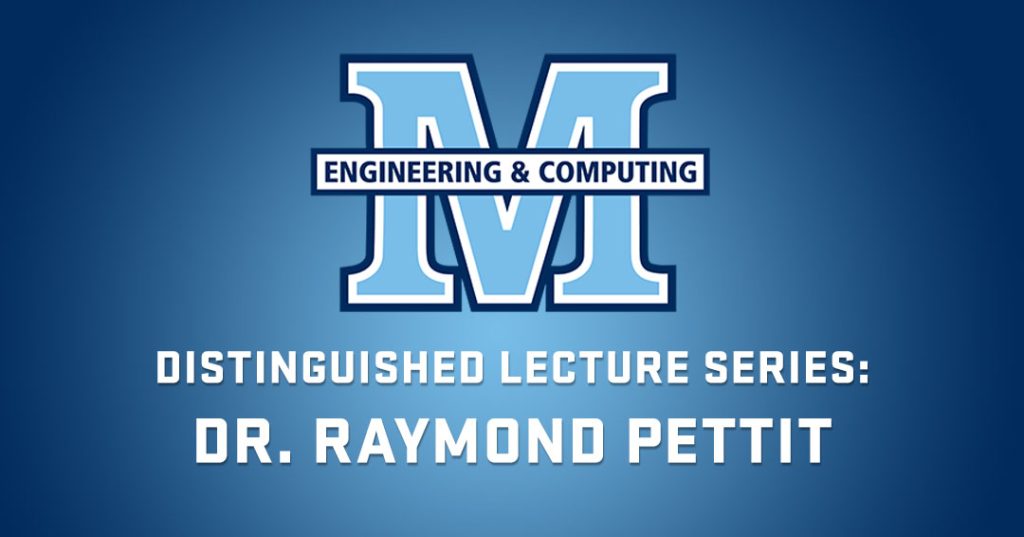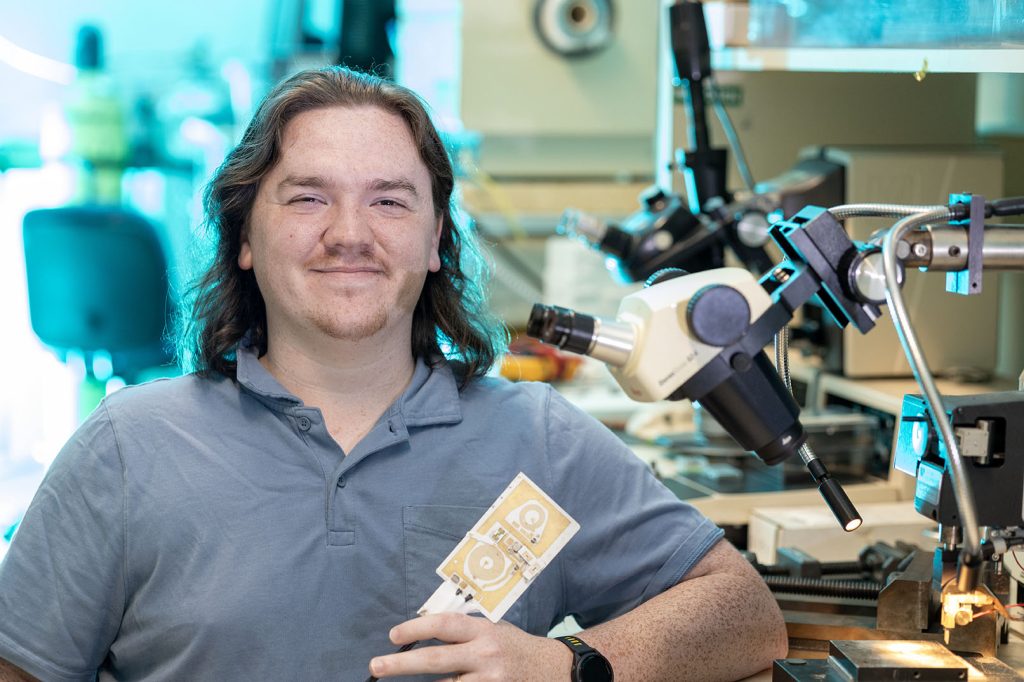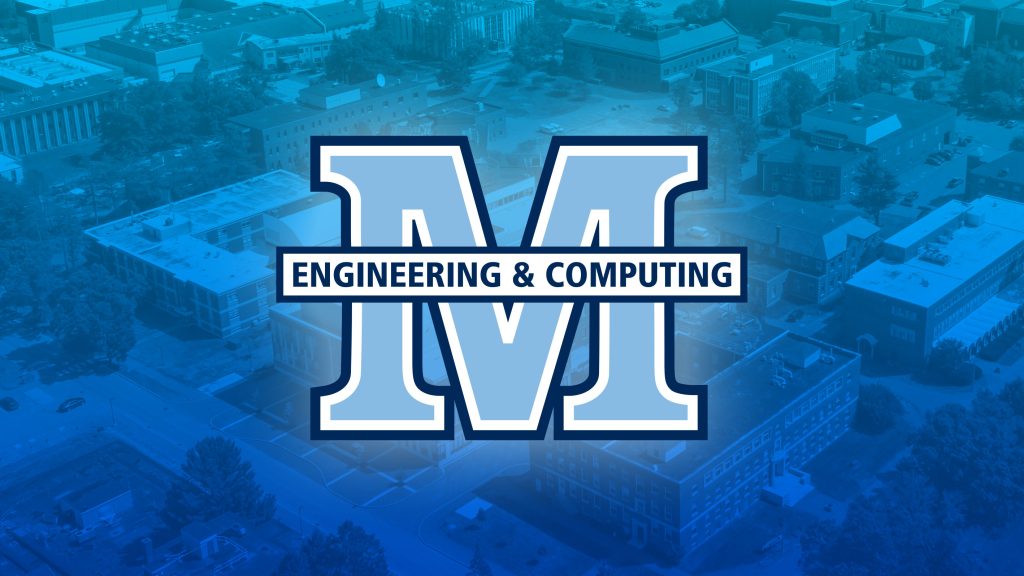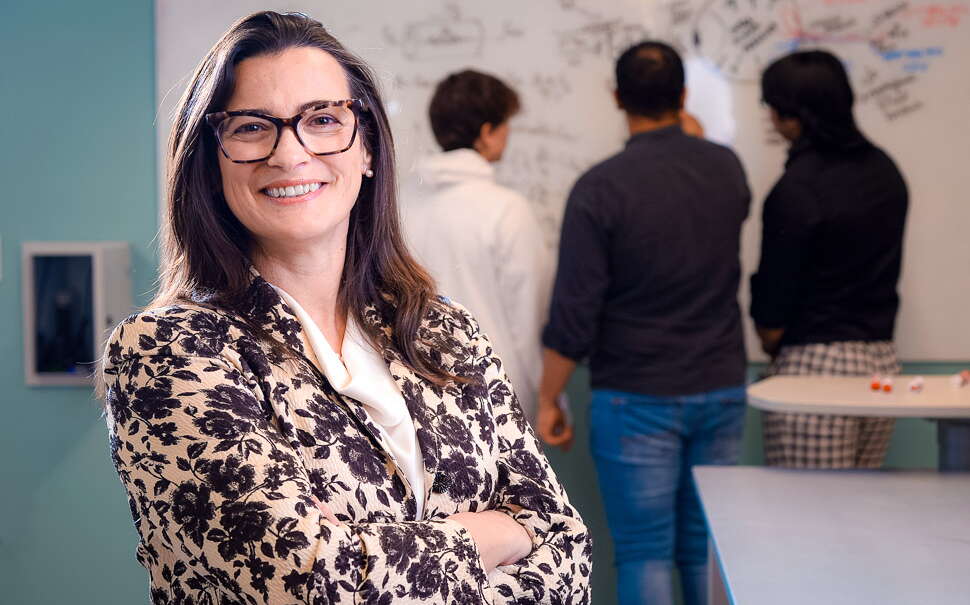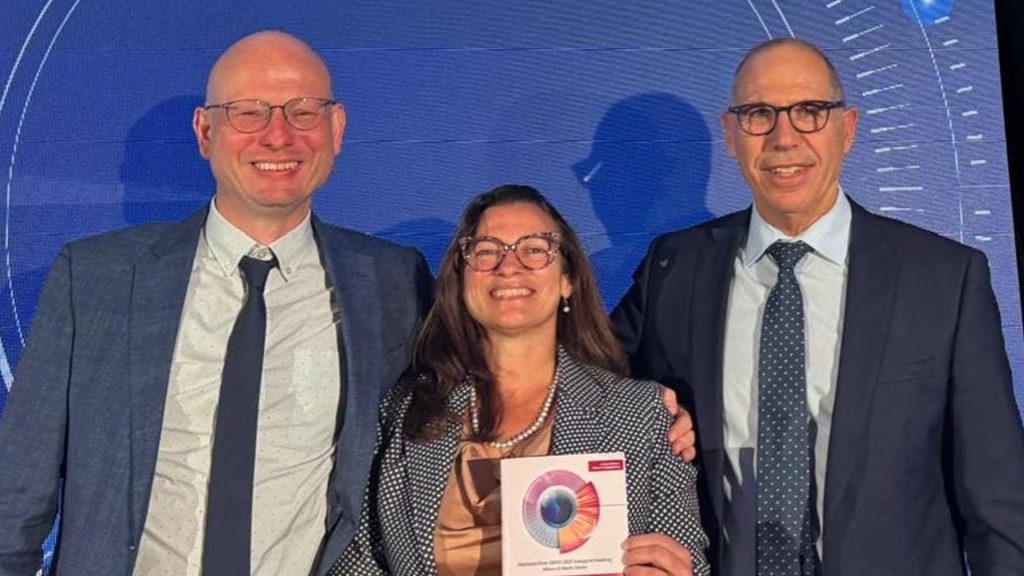New Media
Technology-driven creativity for real-world impact
In New Media, you’ll learn a variety of skills to help you manage the complexities of today’s digital projects, from designing a logo to coding a website to filming and editing a video. Yet the New Media curriculum will also dive you deeply into one or two subjects of your choosing. The result is what employers call a “T-shaped” person: someone with mastery of one specialty as well as a broad array of related skills.
Learn cutting-edge skills
The New Media major teaches skills that creative people need to succeed in the 21st century.
The Internet, social software, hand-held and wearable devices, touch and gestural interfaces, the Internet of Things, and virtual reality offer unprecedented opportunities to create useful, delightful, and engaging experiences. In this major, you’ll get deep and far-ranging skills along with a broad understanding of the social and economic impact of cutting-edge technologies. Wondering how ChatGPT and Midjourney are changing the workplace? Our Learning With AI initiative has you covered.
Land a great job
New Media graduates work in globally recognized organizations from Apple to Amazon, from Facebook to the BBC, from Wikipedia to The New York Times.
They’ve also started or joined start-ups and non-profits in graphic design, film, education, and healthcare. The 2018 median salary of a new media designer: $72,500 and a new media programmer: $84,300. New media jobs expected to grow 4% annually through 2028. And with consumer demand for video games, movies, special effects, social media, and 3-D animation growing steadily, jobs prospects are increasing.
Learn to code–and like it
Today’s companies seek employees who understand and write code. New Media approaches computer programming in a fun and creative way via visual and physical computing, augmented reality, and mobile apps, but also shows how graphic designers, musicians, and other artistically inclined people can learn coding to increase their chances of getting a job in their favorite creative field.
Collaborate on complex projects
As a high school student, you probably did most of your homework alone. In real life, however, most work is part of a team, whether you meet in person or coordinate your collaboration over the Internet.
In New Media, we give you the skills to manage complex long-term projects as well as techniques for making everyone accountable–so you don’t end up holding the bag.
Diversify
Some programs train you for a single job as a graphic designer, or a computer programmer, or an animator or filmmaker. But today’s younger workers typically change jobs four times in their first decade out of college, and are increasingly expected to have a diverse range of abilities.
In New Media, you’ll learn a variety of skills to help you manage the complexities of today’s digital projects, from designing a logo to coding a website to filming and editing a video. The New Media curriculum will also dive you deeply into one or two subjects of your choosing. The result is what employers call a “T-shaped” person: someone with mastery of one specialty as well as a broad array of related skills.
Learn by making
You’ll be building projects from your very first New Media course, and you’ll get critiques from professors and classmates from aesthetic, technical, and social perspectives. Your first year as a New Media Major gives you a broad foundation that exposes you to key themes in the history and theory of creative technologies, from digital design and video production to coding and user experience. During your second and third years you’ll cultivate breadth and depth in a concentration of your choosing while getting your hands dirty with projects that build community collaboration and development.
A year-long senior capstone completes your BA. You will conceive, design, produce, and launch a complex and innovative project in areas such as experimental video and animation, mobile and wearable apps, community-based storytelling, and interactive games and installations.
The minimum number of credits required to graduate is 120 with a minimum cumulative grade point average of 2.0. A minimum cumulative grade point average of 2.0 is required in the major, and New Media majors must have a “C-” or better in each required course in their major. New Media majors must complete a minimum of 48 credit hours in New Media courses. All courses required by the New Media degree program must be taken for a grade; courses taken pass/fail will not count. In addition to New Media degree program requirements, students must meet any graduation requirements set forth by the University, such as General Education course requirements, and any requirements required by the College of Liberal Arts and Sciences.
For the first two years as a New Media Major, students acquire a common foundation that exposes them to key themes in the history and theory of creative technologies and provides them a firm grounding in the essential tools and techniques of digital creativity, from digital design and video production to coding and 3D fabrication.
Six category courses in the second and third year cultivate breadth and depth in areas of the student’s choosing. Majors choose a pair of courses from both technical and perceptual classifications (Categories 1 and 2) and then follow with two advanced courses (Category 3). Numerous New Media elective courses are also available in the program.
New Media majors are encouraged also to apply new media strategies and techniques to other fields, including within their required Minor. Students must complete an approved minor in some department outside their home program. For a listing of Minors, see https://catalog.umaine.edu/ > select current catalog > select in right menu Majors and Minors. Minors typically require 18-21 credit hours.
Along with a third-year course in community collaboration and development, a year-long, six-credit senior capstone completes the BA. Here, students conceive, design, produce, and launch an advanced new media project that must incorporate an innovation in expression, application, development, or implementation. Among past capstone projects have included those creating and incorporating experimental documentary, feature, and animated videos, mobile and wearable apps, community-based storytelling, interactive games, and installations.
Each New Media Major is strongly recommended to have a MacBook Pro or MacBook Air laptop capable of performing essential functions that are taught in core New Media courses. Purchase of additional hardware and software may be necessary depending on each student’s specialized interests. Minimum specifications for new media computers are available by consulting Appendix A of the SCIS Common Use Labs in Boardman Hall Lab Manual.
OVERVIEW OF DEGREE REQUIREMENTS
Minimum number of credits required to graduate: 120
Minimum Cumulative GPA required to graduate: 2.0
Minimum number of credits required to complete the major: 51-52
Minimum Grade requirements for courses to count toward major: New Media majors must have a “C-” or better in each course credited to the major.
Other GPA requirements to graduate: Cumulative GPA of 2.0 or better in the courses in the major field that are credited toward the major.
Required Course(s) for fulfilling Capstone Experience: NMD 498 and NMD 499
Residency Requirement: 24 credits
Course satisfying the writing intensive requirement within the major: NMD 498
Contact Information:
Velma Figgins, Administrative Specialist
5711 Boardman Hall, Room 348
207-581-4358
The requirements listed on this page are specific to this particular major. Students are also responsible for meeting any graduation requirements set out by their college. Students in the College of Liberal Arts and Sciences (CLAS) should make sure to review those requirements as stated on the College of Liberal Arts & Sciences page of the catalog.
For more information about our undergraduate program, program learning outcomes, internships, and career opportunities see our website at:
https://umaine.edu/newmedia/
Core Requirements – 39-40 credits
- ENG 315 – Research Writing in the Disciplines Credits: 3
or
ENG 317 – Business and Technical Writing Credits: 3 - NMD 100 – Introduction to New Media Credits: 3
- NMD 104 – New Media Design Credits: 3
- NMD 106 – Time-Based Media Credits: 3
- NMD 200 – Designing Humane Tech Credits: 3
- NMD 306 – Community Collaboration and Development Credits: 3
- NMD 340 – Designing and Creating Websites Credits: 3
- NMD 343 – SL: Digital Narrative Workshop I Credits: 3
- NMD 344 – Motion Graphics & Design I Credits: 3
- NMD 345 – Web Applications Credits: 3
- NMD 498 – New Media Capstone I Credits: 3
- NMD 499 – New Media Capstone II Credits: 3
One of the following additional courses is required:
- COS 121 – Coding for Everyone Credits: 3
- COS 125 – Introduction to Problem Solving Using Computer Programming Credits: 4
- NMD 105 – Creative Coding I Credits: 3
Program Electives (Minimum of 12 credits)
Students must take a minimum of four Program Elective courses. Two of the courses must have the NMD designator. Program electives may be taken prior to the senior year by planning your schedule appropriately.
Current roster of Program Elective courses includes:
- ART 250 – Graphic Design I Credits: 3
- ART 270 – Digital Art I Credits: 3
- ART 350 – Graphic Design II Credits: 3
- COS 312 – Video Game Programming Credits: 3
- COS 412 – Advanced Game Programming Credits: 3
- ENG 205 – An Introduction to Creative Writing Credits: 3
- HCD 101 – Introduction to Human-Centered Design Credits: 3
- INV 121 – Fundamentals of Innovation Credits: 3
- NMD 170 – 3D Modeling and Animation Credits: 3
- NMD 211 – Creative Coding II Credits: 3
- NMD 212 – Rapid Prototyping Credits: 3
- NMD 225 – Digital Music Production Credits: 3
- NMD 241 – Documentary Photography and Storytelling Credits: 3
- NMD 250 – Electronic Music Composition I: Item and Arrangement Credits: 3
- NMD 251 – Electronic Music Composition II: Composing a Process Credits: 3
- NMD 295 – Topics in New Media Credits: 1-3
- NMD 324 – Introduction to Narrative Film Making Credits: 3
- NMD 342 – Interaction Design and Physical Computing Credits: 3
- NMD 398 – Topics in New Media Credits: 1-3
- NMD 424 – Narrative Film Making Credits: 3
- NMD 430 – Topics in New Media Credits: 1-3
- NMD 440 – SL: Websites for Clients & Communities Credits: 3
- NMD 441 – Documentary Video and Storytelling Credits: 3
- NMD 442 – User Experience Design Credits: 3
- NMD 443 – Digital Narrative Workshop II Credits: 3
- NMD 444 – Motion Graphics & Design II Credits: 3
- NMD 445 – Mobile Applications Credits: 3
- NMD 490 – Independent Study in New Media Credits: 3
- DIG 500 – Introduction to Digital Curation Credits: 3
- DIG 510 – Metadata Systems Credits: 3
- DIG 540 – Digital Collections & Exhibitions Credits: 3
- DIG 550 – Digital Preservation Credits: 3
- SIE 515 – Human Computer Interaction Credits: 3
- SIE 516 – Interactive Technologies for Solving Real-World Problems Credits: 3
- SIE 557 – Database System Applications Credits: 3
SUGGESTED FOUR-YEAR PLAN FOR THE BA IN NMD
The following is the recommended four-year sequencing for courses for New Media majors. Students may rearrange the ordering of courses with their advisor assuming course prerequisites are met.
First Year – First Semester
- ENG 101 – College Composition Credits: 3
- NMD 100 – Introduction to New Media Credits: 3
- NMD 104 – New Media Design Credits: 3
- General Education Requirement (Math)
- General Education Requirement (Ethics)
First Year – Second Semester
- NMD 105 – Creative Coding I Credits: 3
- NMD 106 – Time-Based Media Credits: 3
- General Education Requirement (Applied Science)
- General Education Requirement (Cultural Diversity and International Perspectives)
- General Education Requirement
Second Year – First Semester
- NMD 200 – Designing Humane Tech Credits: 3
- NMD 345 – Web Applications Credits: 3
- Program Elective Credits: 3 (Required)
- General Education Requirement (Western Cultural Tradition)
- Minor Course
Second Year – Second Semester
- NMD 340 – Designing and Creating Websites Credits: 3
- NMD 344 – Motion Graphics & Design I Credits: 3
- Program Elective Credits: 3
- General Education Requirement (Lab Science)
- Minor Course
Third Year – First Semester
- ENG 315 – Research Writing in the Disciplines Credits: 3
OR
ENG 317 – Business and Technical Writing Credits: 3 - NMD 343 – SL: Digital Narrative Workshop I Credits: 3
- Program Elective Credits: 3
- General Education Requirement
- Minor Course
Third Year – Second Semester
- NMD 306 – Community Collaboration and Development Credits: 3
- Program Elective Credits: 3 (Required)
- General Education Requirement (Population & Environment)
- General Education Requirement
- Minor Course
Fourth Year – First Semester
- NMD 498 – New Media Capstone I Credits: 3
- Free Elective (may be NMD elective)
- Free Elective (may be NMD elective)
- Free Elective
- Minor Course
Fourth Year – Second Semester
- NMD 499 – New Media Capstone II Credits: 3
- Free Elective (may be NMD elective)
- Free Elective (may be NMD elective)
- Free Elective
- Minor Course
Note: Students wishing to study abroad should schedule their away time the spring of their sophomore year or the fall of their junior year.
Minors & Certificates
Interested in new/emerging media and technology? The New Media minor may be perfect for you. The Department of New Media created the minor in new/emerging media for the consideration of all students at the University of Maine. Expertise in new and emerging media enhances any major. Expand your comprehension of contemporary communication practices-including digital, mobile, and social media-while learning some of the most effective ways to interact in this continuously evolving environment. Focus on both critical and creative tools across disciplines to build upon your specific goals and interests.
This minor in New Media is designed to prepare students to perform professionally, academically, and personally in a diverse new media environment. The minor provides a foundation upon which students build an understanding of New Media in relation to art, art history, communication, computer science, English, engineering, philosophy, psychology, music, and more.
The minor in New Media is designed for students seeking an introduction to the interdisciplinary applications of computer-based media. The minor enables students from a variety of majors to:
Learn the technical considerations involved with computer-based manipulation of image.
Develop aesthetic abilities and problem-solving skills required in creating effective communication in digital environments.
Understand the interrelationships of new digital media to various professions and fields of study.
The New Media minor explores multiple perspectives of how information or content is created and shaped in new and emerging media, as well as the role and impact of those media on human communication. New Media refers to the emerging digital technologies that enable information to be produced, stored, transmitted, and displayed in new ways. Students will gain an understanding of how these technologies change the ways various types of content can be created, managed, and distributed, as well as their potential to influence the content itself.
Key Concepts, Skills, and Methods
Fieldwork for understanding people’s needs and the influence of context
Generative approaches to imagining many possible solutions, such as sketching and an interaction design method know as
User Experience prototyping
Iterative refinement of designs
Implementation of iterative prototypes
Evaluation techniques, including empirical evaluation methods
Benefits of this Minor
Provides students with a variety of digital technology skills
Increases knowledge base beyond common core
Introduces students to cutting-edge digital technologies
Application of New Media concepts in support of a wide variety of majors
Job-ready problem-solving and design skills for the modern workplace
Minor Requirements
Students pursuing the minor in New Media must complete a total of 18 credits, including 6 credits of introduction to New Media and 12 credits of New Media elective courses.
Introduction to New Media (2 courses = 6 credits)
NMD 100 – Introduction to New Media Credits: 3
NMD 104 -New Media Design Credits: 3
NMD 105 – Creative Coding I Credits: 3
NMD 106 – Time-Based Media Credits: 3
Electives in New Media (4 courses = 12 credits)
NMD 200 – Designing Humane Tech Credits: 3
NMD 211 – Creative Coding II Credits: 3
NMD 245 – Film Criticism and Theory Credits: 3
NMD 250 – Electronic Music Composition I: Item and Arrangement Credits: 3
NMD 251 – Electronic Music Composition II: Composing a Process Credits: 3
NMD 295 – Topics in New Media Credits: 3
NMD 306 – Community Collaboration and Development Credits: 3
NMD 324 – Introduction to Narrative Film Making Credits: 3
NMD 341 – Documentary Photography and Storytelling Credits: 3
NMD 342 – Interaction Design and Physical Computing Credits: 3
NMD 343 – SL: Digital Narrative Workshop I Credits: 3
NMD 344 – Time-Based Art and Design I Credits: 3
NMD 345 – Web Applications Credits: 3
NMD 358 – Documentary Film Criticism and Theory Credits: 3
NMD 370 – 3D Modeling and Animation Credits: 3
NMD 398 – Topics in New Media Credits: 3
NMD 424 – Narrative Film Making Credits: 3
NMD 430 – Topics in New Media Credits: 3
NMD 441 – Documentary Video and Storytelling Credits: 3
NMD 442 – User Experience Design Credits: 3
NMD 443 – Digital Narrative Workshop II Credits: 3
NMD 444 – Time-Based Art and Design II Credits: 3
NMD 445 – Mobile Applications Credits: 3
Minimum Credits Required: 18
Program Overview
The Game Design and Development (GDD) minor provides students with an interdisciplinary foundation in the principles and practices of creating interactive games. Students gain experience in areas such as computer programming, 3D modeling, storytelling, and sound design. Courses are drawn from a variety of departments, including Computer Science, New Media, Human-Centered Technology and Design, Philosophy, English, Art, and Spatial Computing.
Learning Outcomes
Students who complete the GDD minor will be able to:
- Design and prototype interactive games using problem-solving and technical skills.
- Develop assets in areas such as audio design, storytelling, character creation, and environmental modeling.
- Apply user-centered, participatory, and inclusive design principles.
Benefits of the Minor
- Gain hands-on experience in creative problem-solving, game prototyping, and development.
- Participate in entrepreneurial and interdisciplinary collaborations that reflect real-world game development environments.
Academic Requirements
- Minimum Credits: 18
- Minimum Grade per Course: C–
- GPA Requirement for Minor: 2.0 cumulative GPA in minor courses
- UMaine Residency Requirement: At least 9 credits must be earned at the University of Maine
- Credit Sharing Policy: A maximum of 9 credits may be applied to both a major and the GDD minor
Contact Information
Velma Figgins
School of Computing and Information Science
348 Boardman Hall
(207) 581-4358
vfiggins@maine.edu
Required Core Courses (12–13 credits)
Choose one course from each pair:
- Introductory Programming
- COS 125 – Introduction to Problem Solving Using Computer Programming (4 credits)
or - NMD 105 – Creative Coding I (3 credits)
- COS 125 – Introduction to Problem Solving Using Computer Programming (4 credits)
- Object-Oriented Programming
- COS 225 – Object-Oriented Design, Programming, and Data Structures (3 credits)
or - NMD 211 – Creative Coding II (3 credits)
- COS 225 – Object-Oriented Design, Programming, and Data Structures (3 credits)
- Game Programming
- COS 312 – Video Game Programming (3 credits)
- 3D Modeling
- NMD 170 – 3D Modeling and Animation (3 credits)
Elective Courses (Choose 2 or more, minimum of 6 credits)
- ART 110 – 2-D Design
- ART 250 – Graphic Design I
- ART 270 – Digital Art I
- COS 412 – Advanced Game Programming
- COS 417 – Spatial Interaction Design
- HCD 101 – Introduction to Human-Centered Design
- HCD 218 – User Interface and User Experience Design
or- NMD 104 – New Media Design
- HCD 310 – Interactive Systems Design and Development
- NMD 225 – Digital Music Production
- NMD 442 – User Experience Design
- ENG 131 – The Nature of Story
- PHI 222 – Philosophy of Games
- SIE 516 – Interactive Technologies for Solving Real-World Problems
Digital Curation graduate certificate requirements
For the official catalog requirements, consult the Graduate Catalog > choose year in pull down window > select Graduate Programs, Certificates and Specializations > select Digital Curation (Certificate)
In short, the the certificate requires 12 credits acquired through four 3-credit required courses.
The four required courses include:
DIG 500 Introduction to Digital Curation
DIG 510 Metadata
DIG 540 Digital Collections and Exhibitions
DIG 550 Digital Preservation
Numerous additional germane elective distance courses are suggested below and are regularly available.
Digital Curation Program Description and Background
See background, news and details about the Digital Curation graduate certificate program.
See also the description of the program and the application process provided at UMaine Online,
Digital Curation Graduate Courses
DIG 500 – Introduction to Digital Curation
As the introductory course to the Digital Curation program, this class surveys the variety of digital artifacts that we consciously or unconsciously create and consume today, with a focus on how to collect and manage digitized and born-digital artifacts and their related data. Students lean technical skills such as how to digitize analog documents, photographs, and videos, as well as curatorial knowledge such as how selection criteria vary as a function of type of institution (archives v. libraries v. museum) and field (art v. archeology). The course also reviews methods for ensuring the ongoing integrity of the artifact and laws governing the acquisition and use of intellectual property, such as how copyright extends to images, editions, and future versions of a work.
Credits: 3
DIG 510 – Metadata Systems
This course covers digital formats for describing the contents and contexts of artifacts with an emphasis on their use in libraries, archives, and online repositories. This includes a discussion on the need for and use of metadata in a variety of digital contexts, exposure to specific metadata standards used in a number of fields, and demonstrations of how these metadata are expressed in several output formats.
Prerequisites & Notes
DIG 500 strongly recommended
Credits: 3
DIG 540 – Digital Collections & Exhibitions
This course covers the technical means and social consequences of assembling and sharing cultural data and artifacts. Topics include the fundamentals of relational databases; a survey of collection management packages, both proprietary and open-source; and an introduction to the special concerns and programming concepts necessary to customize off-the-shelf database solutions for domain and content appropriateness.
Prerequisites & Notes
DIG 500 and 510 strongly recommended
Credits: 3
DIG 550 – Digital Preservation
This course acquaints students with the challenges of, and best practices for, preserving digital artifacts. Topics include a survey of the (sometimes bewildering) array of formats for digital media, along with their vulnerabilities and half-lives; analysis of various preservation strategies (storage, migration, emulation, reinterpretation); institutional, legal, and practical impediments to preservation; preservation standards and resources for digital media (Media Matters, Variable Media Questionnaire).
Prerequisites & Notes
DIG 500, 510, and 540 strongly recommended
Credits: 3
DIG 580 – Digital Curation Internship
Digital Curation Internships provide valuable experiential learning in an emerging and changing field that provides complex challenges. An internship experience is essential to the certificate program, providing students with current and vital knowledge and skills they will need in the workplace. Internships provide students opportunities to reinforce their academic learning, and provide opportunities to establish professional contacts. Because our digital curation curriculum is online, and because our students will be located in many different places, we offer two types of internships: place-based and virtual.
Prerequisites & Notes
Permission.
Credits: 1-3
Elective Courses
Additional elective complementary courses are suggested at UMaine Online
School of Computing & Information Science
Director – School of Computing & Information Science
Administrative Support Supervisor – School of Computing & Information Science
Administrative Specialist, New Media, School of Computing & Information Science
5711 Boardman Hall
Room 348
Orono, ME 04469
Tel: 207.581.21
MCEC NEWS


